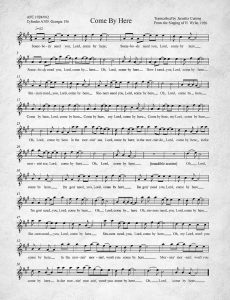S.C. Encyclopedia | Up until the Yamassee War of 1715, Indian languages were the most frequently spoken, but by 1730 the majority of people in South Carolina spoke African languages or an African-English creole language called Gullah or Geechee. At the beginning of the colonial era Africans numbered only a few hundred, but by 1775 their numbers had increased to 107,300. Europeans numbered only 71,300 by that date, and Indians had dwindled from 10,000 to 500.

“Come by here” is a translation of the Gullah “Kum ba yah,” a song familiar now throughout the world. Learn more.
Africans were brought to Carolina in bondage, and any children born to them were also considered property. Concentrated along coastal rice and indigo plantations, Africans sometimes outnumbered Europeans by a ratio of nine to one. Sullivan’s Island, where new slaves were quarantined before auction, has been called the “Ellis Island of black Americans.” In the latter half of the colonial era, they spoke more than twenty different languages of the large African language family of Niger-Kordofanian. Their homelands were West Africa between present-day Senegal and southern Nigeria and the Angola-Congo region further to the south. The earliest Africans to arrive in the colony with the planters from Barbados probably had learned English as a second language, and those who came during the first fifty years of the colony would also have had opportunity to become bilingual in English. After the 1720s, however, newcomers had little contact with English speakers, and Gullah developed as a common language among Africans. Its grammatical structure was formed from a combination of abstract selections chosen from the early African languages (probably Senegambia and the Gold Coast) spoken in the colony and through principles of language universals, while its vocabulary was primarily English with some African words used for personal names, numbers, and days of the week. Its pronunciation and intonation patterns reflect those of the original African languages. Later arrivals from Africa, many of whom came from the Angola-Congo region that may be the source of the name Gullah as well as many personal names, came until well into the nineteenth century. Gullah is a unique language created in the coastal regions of South Carolina and Georgia for mutual communication between peoples who shared no other common one. European children on large plantations often learned it as a second language from their caretakers and playmates in the slave quarters.
By the late twentieth century, the primary language of South Carolina was English. Gullah had become a language used in the home and in private community exchanges; many outsiders do not realize that it is still spoken. The structural influence of this creole language can be seen in African American varieties of English through the state, as well as the nation, in such features as absence of copulas or the be-verbs (You better throw that [tea] out because it too weak), absence of -s for third-person singular verbs (He work in the stable right now), absence of possessive -s before nouns (We go in our cousin car), and consonant cluster reduction before vowels (bes’ apple).
By the early twenty-first century preschool children and the elderly who often cared for them continued to speak South Carolina’s unique creole language in coastal African American homes. Commonly heard creole constructions in the verb phrase were a preverbal duh for habitual action (She duh hit me = She’s always hitting me); a preverbal fuh for obligation (I fuh clean the house = I have to clean the house); a preverbal done for completed action (Teria dog done get hit = Teria’s dog got hit); and been for simple past (And then a big bruise been right there). In a noun phrase, ee and um can be used as the third-personal pronoun in subject and object positions respectively (Ee hard? [referring to a football] versus And the snake was dead; we throw rock on um [referring to the snake]); ee can also be used to indicate possession (So that been on her floor, in ee house); and yuna is sometimes used for the second-personal plural pronoun (Ee say, “This how yuna talk?” = He said, “Is this how you all talk?”).
– Excerpted from the entry by Patricia Causey Nichols. To read more about this or 2,000 other entries about South Carolina, check out The South Carolina Encyclopedia by USC Press. (Information used by permission.)



 We Can Do Better, South Carolina!
We Can Do Better, South Carolina!
























